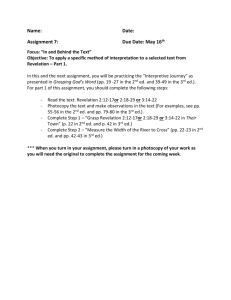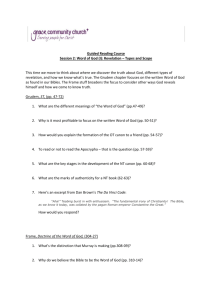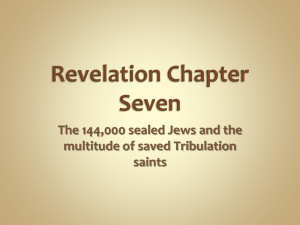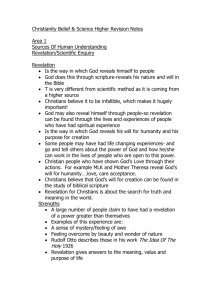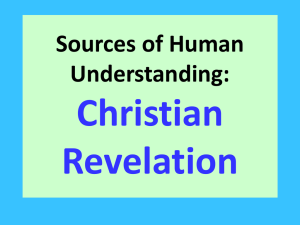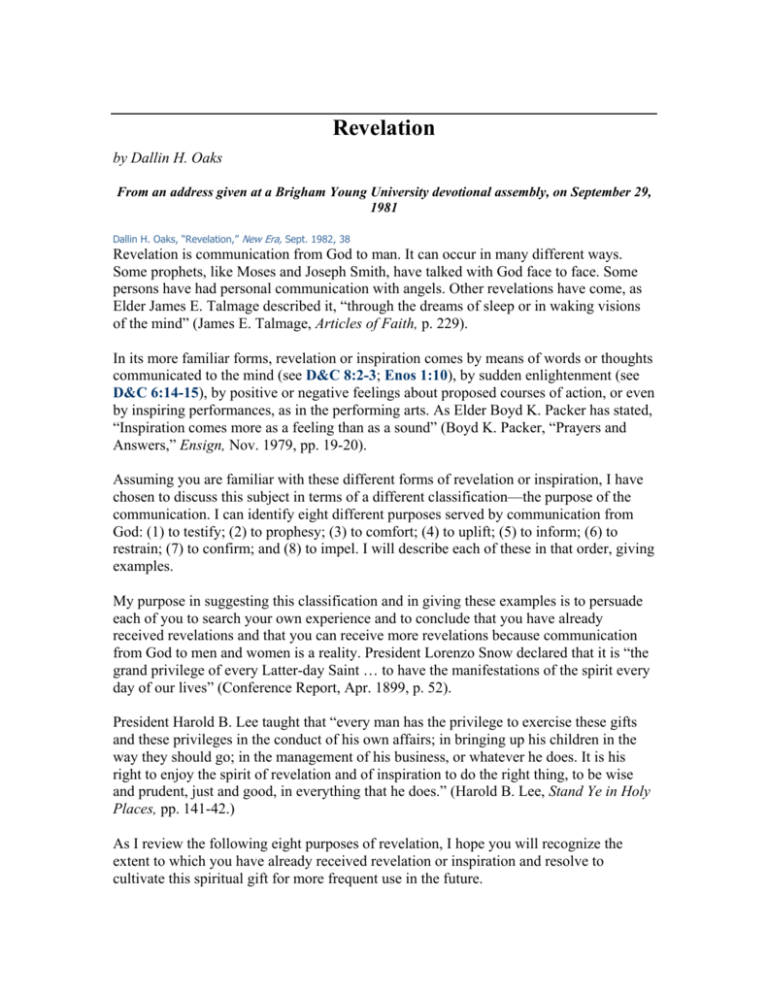
Revelation
by Dallin H. Oaks
From an address given at a Brigham Young University devotional assembly, on September 29,
1981
Dallin H. Oaks, “Revelation,” New Era, Sept. 1982, 38
Revelation is communication from God to man. It can occur in many different ways.
Some prophets, like Moses and Joseph Smith, have talked with God face to face. Some
persons have had personal communication with angels. Other revelations have come, as
Elder James E. Talmage described it, “through the dreams of sleep or in waking visions
of the mind” (James E. Talmage, Articles of Faith, p. 229).
In its more familiar forms, revelation or inspiration comes by means of words or thoughts
communicated to the mind (see D&C 8:2-3; Enos 1:10), by sudden enlightenment (see
D&C 6:14-15), by positive or negative feelings about proposed courses of action, or even
by inspiring performances, as in the performing arts. As Elder Boyd K. Packer has stated,
“Inspiration comes more as a feeling than as a sound” (Boyd K. Packer, “Prayers and
Answers,” Ensign, Nov. 1979, pp. 19-20).
Assuming you are familiar with these different forms of revelation or inspiration, I have
chosen to discuss this subject in terms of a different classification—the purpose of the
communication. I can identify eight different purposes served by communication from
God: (1) to testify; (2) to prophesy; (3) to comfort; (4) to uplift; (5) to inform; (6) to
restrain; (7) to confirm; and (8) to impel. I will describe each of these in that order, giving
examples.
My purpose in suggesting this classification and in giving these examples is to persuade
each of you to search your own experience and to conclude that you have already
received revelations and that you can receive more revelations because communication
from God to men and women is a reality. President Lorenzo Snow declared that it is “the
grand privilege of every Latter-day Saint … to have the manifestations of the spirit every
day of our lives” (Conference Report, Apr. 1899, p. 52).
President Harold B. Lee taught that “every man has the privilege to exercise these gifts
and these privileges in the conduct of his own affairs; in bringing up his children in the
way they should go; in the management of his business, or whatever he does. It is his
right to enjoy the spirit of revelation and of inspiration to do the right thing, to be wise
and prudent, just and good, in everything that he does.” (Harold B. Lee, Stand Ye in Holy
Places, pp. 141-42.)
As I review the following eight purposes of revelation, I hope you will recognize the
extent to which you have already received revelation or inspiration and resolve to
cultivate this spiritual gift for more frequent use in the future.
1. The testimony or witness of the Holy Ghost that Jesus is the Christ and that the
gospel is true is a revelation from God.
When the apostle Peter affirmed that Jesus Christ was the Son of the living God, the
Savior called him blessed, “for flesh and blood hath not revealed it unto thee, but my
Father which is in heaven” (Matt. 16:17). This precious revelation can be part of the
personal experience of every seeker after truth and, once received, becomes a pole star to
guide in all the activities of life.
2. Prophecy is another purpose or function of revelation.
Speaking under the influence of the Holy Ghost and within the limits of his or her
responsibility, a person may be inspired to predict what will come to pass in the future.
The one who holds the office of the prophet, seer, and revelator prophesies for the
Church, as when Joseph Smith prophesied concerning the Civil War (see D&C 87) and
foretold that the Saints would become a mighty people in the Rocky Mountains.
Prophecy is part of the calling of a patriarch. Each of us is also privileged occasionally to
receive prophetic revelation illuminating future events in our lives, like a Church calling
we are to receive. To cite another example, after our fifth child was born, my wife and I
did not have any more children. After more than 10 years we concluded that our family
would not be any larger, which grieved us. Then one day, while my wife was in the
temple, the Spirit whispered to her that she would have another child. That prophetic
revelation was fulfilled about a year and a half later with the birth of our sixth child, for
whom we had waited 13 years.
3. A third purpose of revelation is to give comfort.
Such a revelation came to the Prophet Joseph Smith in Liberty Jail. After many months in
deplorable conditions, he cried out in agony and loneliness, pleading for the Lord to
remember him and the persecuted Saints. The comforting answer came:
“My son, peace be unto thy soul; thine adversity and thine afflictions shall be but a small
moment; And then, if thou endure it well, God shall exalt thee on high; thou shalt triumph
over all thy foes” (D&C 121:7-8).
In that same revelation the Lord declared that no matter what tragedies or injustices
should befall the Prophet, “Know thou, my son, that all these things shall give thee
experience, and shall be for thy good” (D&C 122:7).
Each of us knows of other examples of revelations of comfort. Some have been
comforted by visions of departed loved ones or by feeling their presence. The widow of a
good friend told me that she had felt the presence of her departed husband, giving her
assurance of his love and concern for her. Others have been comforted in adjusting to the
loss of a job or a business advantage or even a marriage. A revelation of comfort can also
come in connection with a blessing of the priesthood, either from the words spoken or
simply from the feeling communicated in connection with the blessing.
Another type of comforting revelation is the assurance received that a sin has been
forgiven. After praying fervently for an entire day and night, a Book of Mormon prophet
recorded that he heard a voice, which said “Thy sins are forgiven thee, and thou shalt be
blessed.
“Wherefore,” Enos wrote, “my guilt was swept away.” (Enos 1:5-6; also see D&C 61:2.)
This assurance, which comes when a person has completed all the steps of repentance,
gives assurance that the price has been paid, that God has heard the repentant sinner, and
that his or her sins are forgiven. Alma described that moment as a time when he was no
longer “harrowed up by the memory” of his sins. “And oh, what joy, and what marvelous
light I did behold; yea, my soul was filled with joy … there can be nothing so exquisite
and sweet as was my joy.” (Alma 36:19-21.)
4. Closely related to the feeling of comfort is the fourth purpose or function of
revelation, to uplift.
At some time in our lives each of us needs to be lifted up from a depression, from a sense
of foreboding or inadequacy, or just from a plateau of spiritual mediocrity. Because it
raises our spirits and helps us resist evil and seek good, I believe that the feeling of uplift
that is communicated by reading the scriptures or by enjoying wholesome music, art, or
literature is a distinct purpose of revelation.
5. The fifth purpose of revelation is to inform.
This may consist of inspiration giving a person the words to speak on a particular
occasion, such as in the blessings pronounced by a patriarch or in sermons or other words
spoken under the influence of the Holy Ghost. The Lord commanded Joseph Smith and
Sidney Rigdon to lift up their voices and speak the thoughts that would be put into their
hearts, “for it shall be given you in the very hour, yea, in the very moment, what ye shall
say” (D&C 100:5-6; also D&C 84:85; D&C 124:97).
On some sacred occasions, information has been given by face-to-face conversations with
heavenly personages, such as in the visions related in ancient and modern scripture. In
other circumstances, needed information is communicated by the quiet whisperings of the
Spirit. A child loses a treasured possession, prays for help, and is inspired to find it; an
adult has a problem at work, at home, or in genealogical research, prays, and is led to the
information necessary to resolve it; a church leader prays to know who the Lord would
have him call to fill a position, and the Spirit whispers a name. In all of these examples—
familiar to each of us—the Holy Ghost acts in his office as a teacher and revelator,
communicating information and truths for the edification and guidance of the recipient.
Revelation from God serves all five of these purposes: testimony, prophecy, comfort,
uplift, and information. I have spoken of these only briefly, giving examples principally
from the scriptures. I will speak at greater length about the remaining three purposes of
revelation, giving examples from my personal experience.
6. The sixth type or purpose of revelation is to restrain us from doing something.
Thus, in the midst of a great sermon explaining the power of the Holy Ghost, Nephi
suddenly declares, “And now I … cannot say more; the Spirit stoppeth mine utterance” (2
Ne. 32:7). The revelation that restrains is one of the most common forms of revelation. It
often comes by surprise, when we have not asked for revelation or guidance on a
particular subject. But if we are keeping the commandments of God and living in tune
with his Spirit, a restraining force will steer us away from things we should not do.
One of my first experiences in being restrained by the Spirit came soon after I was called
as a counselor in a stake presidency in Chicago. In one of our first stake presidency
meetings our stake president made a proposal that our new stake center be built in a
particular location. I immediately saw four or five good reasons why that was the wrong
location. When asked for my counsel, I opposed the proposal, giving each of those
reasons. The stake president wisely proposed that each of us consider the matter
prayerfully for a week and discuss it further in our next meeting. Almost perfunctorily I
prayed about the subject and immediately received a strong impression that I was wrong,
that I was standing in the way of the Lord’s will, and that I should remove myself from
opposition to it. Needless to say, I was restrained and promptly gave my approval to the
proposed construction. Incidentally, the wisdom of constructing the stake center at that
location was soon evident, even to me. My reasons to the contrary turned out to be shortsighted, and I was soon grateful to have been restrained from relying on them.
Several years ago I picked up the desk pen in my office at BYU to sign a paper that had
been prepared for my signature, something I did at least a dozen times each day. That
document committed the University to a particular course of action we had decided to
follow. All the staff work had been done, and all appeared to be in order. But as I went to
sign the document, I was filled with such negative thoughts and forebodings that I put it
to one side and asked for the entire matter to be reviewed again. It was, and within a few
days additional facts came to light which showed that the proposed course of action
would have caused the University serious problems in the future.
On another occasion the Spirit came to my assistance as I was editing a casebook on a
legal subject. A casebook consists of several hundred court opinions, together with
explanatory material and text written by the editor. My assistant and I had finished almost
all of the work on the book, including the necessary research to assure that these court
opinions had not been reversed or overruled. Just before sending it to the publisher, I was
leafing through the manuscript and a particular court opinion caught my attention. As I
looked at it, I had a profoundly uneasy feeling. I asked my assistant to check that opinion
again to see if everything was in order. He reported that it was. In a subsequent check of
the completed manuscript, I was again stopped at that case, again with great feelings of
uneasiness. This time I went to the law library myself. There, in some newly received
publications, I discovered that this case had just been reversed on appeal. If that opinion
had been published in my casebook, it would have been a serious professional
embarrassment. I was saved by the restraining power of revelation.
7. A common way to seek revelation is to propose a particular course of action and
then to pray for inspiration to confirm it.
The Lord explained the confirming type of revelation when Oliver Cowdery failed in his
efforts to translate the Book of Mormon:
“Behold, you have not understood; you have supposed that I would give it unto you,
when you took no thought save it was to ask me.
“But, behold, I say unto you, that you must study it out in your mind; then you must ask
me if it be right, and if it is right I will cause that your bosom shall burn within you;
therefore, you shall feel that it is right.” (D&C 9:7-8.)
Similarly, the prophet Alma likens the word of God to a seed and tells persons studying
the gospel that if they will give place for the seed to be planted in their heart, the seed
will enlarge their souls and enlighten their understanding and begin to be delicious to
them (see Alma 32). That feeling is the Holy Ghost’s confirming revelation of the truth
of the word.
When he spoke on the BYU campus some years ago on the subject “Agency or
Inspiration,” Elder Bruce R. McConkie stressed our responsibility to do all that we can
before we seek a revelation. He gave a very personal example. When he set out to choose
a companion for eternity, he did not go to the Lord and ask whom he ought to marry. “I
went out and found the girl I wanted,” he said. “She suited me; … it just seemed … as
though this ought to be. … [Then] all I did was pray to the Lord and ask for some
guidance and direction in connection with the decision that I’d reached.” (Speeches of the
Year, 1972-73; pp. 107, 111.)
Elder McConkie summarized his counsel on the balance between agency and inspiration
as follows:
“We’re expected to use the gifts and talents and abilities, the sense and judgment and
agency with which we are endowed. … [I]mplicit in asking in faith is the precedent
requirement that we do everything in our power to accomplish the goal that we seek. …
We’re expected to do everything in our power that we can, and then to seek an answer
from the Lord, a confirming seal that we’ve reached the right conclusion.” (Pp. 108, 110,
113.)
As a Regional Representative I was privileged to work with four different members of the
Quorum of the Twelve and with other General Authorities as they sought revelation in
the calling of stake presidents. All proceeded in the same manner. They interviewed
persons residing in the stake—counselors in the stake presidency, members of the high
council, bishops, and others who had gained special experience in church
administration—asking them questions and hearing their counsel. As these interviews
were conducted, the servants of the Lord gave prayerful consideration to each person
interviewed and mentioned. Finally, they reached a tentative decision on the new stake
president. This proposal was then prayerfully submitted to the Lord. If confirmed, the call
was issued. If not confirmed, or if restrained, that proposal was tabled and the process
continued until a new proposal was formed and the confirming revelation was received.
Sometimes confirming and restraining revelations are combined. For example, during my
service at BYU I was invited to give a speech before a national association of attorneys.
Because it would require many days to prepare, this was the kind of speaking invitation I
had routinely declined. But as I began to dictate a letter declining this particular
invitation, I felt restrained. I paused and reconsidered my action. I then considered how I
might accept the invitation, and as I came to consider it in that light, I felt the confirming
assurance of the Spirit and knew that this was what I must do.
The speech that resulted, “A Private University Looks at Government Regulation,”
opened the door to a host of important opportunities. I was invited to repeat that same
speech before several other nationally prominent groups. It was published in Vital
Speeches, in a professional journal, and in several other periodicals and books, from
which it was used as a leading statement of the private university’s interest in freedom
from government regulation. This speech led to BYU’s being consulted by various
church groups on the proper relationship between government and a church-related
college. These consultations in turn contributed to the formation of a national
organization of church-related colleges and universities that has provided a significant
coalition to oppose unlawful or unwise government regulation in the future. I have no
doubt, as I look back on the event, that this speaking invitation I almost declined was one
of those occasions when a seemingly insignificant act made a great deal of difference.
Those are the times when it is vital for us to receive the guidance of the Lord, and those
are the times when revelation will come to aid us if we will hear and heed it.
8. The eighth purpose or type of revelation consists of those instances where the
Spirit impels a person to action.
This is not a case where a person proposes to take a particular action and the Spirit either
confirms or restrains. This is a case where revelation comes when it is not being sought
and impels some action not proposed. This type of revelation is obviously less common
than other types, but its rarity makes it all the more significant.
A scriptural example is recorded in the first book of Nephi. After Nephi obtained the
precious records from the treasury in Jerusalem, the Spirit of the Lord directed him to kill
Laban as he lay drunk in the street. This act was so far from Nephi’s heart that he
recoiled and wrestled with the Spirit, but he was again directed to slay Laban, and he
finally followed that revelation. (See 1 Ne. 4.)
Students of Church history will recall Wilford Woodruff’s account of an impression that
came to him in the night telling him to move his carriage and mules away from a large
tree. He did so, and his family and livestock were saved when the tree crashed to the
ground in a tornado that struck 30 minutes later. (See Matthias F. Cowley, Wilford
Woodruff, History of His Life and Labors, pp. 331-32.)
As a young girl, my grandmother Chasty Olsen Harris had a similar experience. She was
tending some children who were playing in a dry riverbed near their home in Castle Dale,
Utah. Suddenly she heard a voice that called her by name and directed her to get the
children out of the riverbed and up on the bank. It was a clear day and there was no sign
of rain. She saw no reason to heed the voice and continued to play. The voice spoke to
her again, urgently. This time she heeded the warning. Quickly gathering the children,
she made a run for the bank. Just as they reached it, an enormous wall of water,
originating with a cloudburst in the mountains many miles away, swept down the canyon
and roared across where the children had played. Except for this impelling revelation, she
and the children would have been lost.
For nine years Professor Marvin Hill and I had worked on the book Carthage
Conspiracy, which concerns the 1845 court trial of the murderers of Joseph Smith. We
had several different sources of minutes on the trial, some bearing their author’s name
and others unsigned. The fullest set of minutes was unsigned, but because we had located
them in the Church Historian’s Office, we were sure they were the minutes kept by
George Watt, the Church’s official scribe who was sent to record the proceedings of the
trial. We so stated in seven drafts of our manuscript and analyzed all of our sources on
that assumption.
Finally, the book was completed, and within a few weeks the final manuscript would be
sent to the publisher. As I sat in my office at BYU one Saturday afternoon, I felt impelled
to go through the pile of unexamined books and pamphlets accumulated on the table
behind my desk. At the very bottom of a pile of 50 or 60 publications, I found a printed
catalog of the contents of the Wilford C. Wood Museum, which Professor LaMar Berrett,
the author, had sent to me a year and a half earlier. As I quickly flipped through the pages
of this catalog of Church history manuscripts, my eyes fell on a page describing the
manuscript of the trial minutes we had attributed to George Watt. This catalog page told
how Wilford Wood had purchased the original of that set of minutes in Illinois and had
given the Church the typewritten version we had obtained from the Church Historian.
We immediately visited the Wilford Wood Museum in Woods Cross, Utah, and obtained
additional information which enabled us to determine that the minutes we had thought
were the official Church source had been prepared by one of the lawyers for the defense.
With this knowledge we returned to the Church Historian’s Office and were able to locate
for the first time George Watt’s official and highly authentic set of minutes on the trial.
This discovery saved us from a grievous error in the identification of one of our major
sources and also permitted us to enrich the contents of our book significantly. The
impression I received that day in my office is a cherished example of the way the Lord
will help us in our righteous professional pursuits when we qualify for the impressions of
his Spirit.
I had another choice experience with impelling revelation a few months after I began my
service at BYU. As a new and inexperienced president, I had many problems to analyze
and many decisions to reach. I was very dependent on the Lord. One day in October I
drove up Provo Canyon to ponder a particular problem. Although alone and without any
interruption, I found myself unable to think of the problem at hand. Another pending
issue I was not yet ready to consider kept thrusting itself into my mind: should we modify
BYU’s academic calendar to complete the fall semester before Christmas? After 10 or 15
minutes of unsuccessful efforts to exclude thoughts of this subject, I realized what was
happening. The issue of the calendar did not seem timely to me, and I was certainly not
seeking any guidance on it, but the Spirit was trying to communicate on that subject. I
immediately turned my full attention to that question and began to record my thoughts on
a piece of paper. Within a few minutes I had recorded the details of a three-semester
calendar, with all of its powerful advantages.
Hurrying back to the campus, I reviewed this with my colleagues and found them
enthusiastic. A few days later the Board of Trustees approved our proposed new calendar,
and we published its dates, barely in time to make them effective in the fall of 1972.
Since that time I have reread these words of the Prophet Joseph Smith and realized that I
had had the experience he described:
“A person may profit by noticing the first intimation of the spirit of revelation; for
instance, when you feel pure intelligence flowing into you, it may give you sudden
strokes of ideas … and thus by learning the Spirit of God and understanding it, you may
grow into the principle of revelation” (J. F. Smith, ed., Teachings of the Prophet Joseph
Smith, p. 151).
I have now described eight different purposes or types of revelation: (1) testifying, (2)
prophesying, (3) comforting, (4) uplifting, (5) informing, (6) restraining, (7) confirming,
and (8) impelling. Each of these refers to revelations that are received. Before concluding
I will suggest a few ideas about revelations that are not received.
First, we should understand what can be called the principle of “responsibility in
revelation.” Our Heavenly Father’s house is a house of order, where his servants are
commanded to “act in the office in which [they are] appointed” (D&C 107:99). This
principle applies to revelation. Only the President of the Church receives revelation to
guide the entire Church. Only the stake president receives revelation for the special
guidance of the stake. The person who receives revelation for the ward is the bishop. For
a family, it is the priesthood leadership of the family. Leaders receive revelation for their
own areas of responsibility. Individuals can receive revelation to guide their own lives.
But when one person purports to receive revelation for another person outside his or her
own area of responsibility—such as a Church member who claims to have revelation to
guide the entire Church or a person who claims to have a revelation to guide another
person over whom he or she has no presiding authority according to the order of the
Church—you can be sure that such revelations are not from the Lord. “There are
counterfeit signals” (Boyd K. Packer, “Prayers and Answers,” Ensign, Nov. 1979, pp. 1920). Satan is a great deceiver, and he is the source of some of these spurious revelations.
Others are imagined.
If a revelation is outside the limits of your specific responsibility, you know it is not from
the Lord and you are not bound by it. I have heard of cases where a young man told a
young woman she should marry him because he had received a revelation that she was to
be his eternal companion. If this is a true revelation, it will be confirmed directly to the
woman if she seeks to know. In the meantime, she is under no obligation to heed it. She
should seek her own guidance and make up her own mind. The man can receive
revelation to guide his own actions, but he cannot properly receive revelation to direct
hers. She is outside his jurisdiction.
What about those times when we seek revelation and do not receive it?
We do not always receive inspiration or revelation when we request it. Sometimes we are
delayed in the receipt of revelation, and sometimes we are left to our own judgment. We
cannot force spiritual things. It must be so. Our life’s purpose to obtain experience and to
develop faith would be frustrated if our Heavenly Father directed us in every act, even in
every important act. We must make decisions and experience the consequences in order
to develop self-reliance and faith.
Even in decisions we think very important, we sometimes receive no answer to our
prayers. This does not mean that our prayers have not been heard. It only means that we
have prayed about a decision which, for one reason or another, we should make without
guidance by revelation. Perhaps we have asked for guidance in choosing between
alternatives that are equally acceptable or equally unacceptable. I suggest that there is not
a right and wrong to every question. To many questions, there are only two wrong
answers or two right answers. Thus, a person who seeks guidance on which of two
different ways he should pursue to get even with a person who has wronged him is not
likely to receive a revelation. Neither is a person who seeks guidance on a choice he will
never have to make because some future event will intervene, such as a third alternative
that is clearly preferable. On one occasion, my wife and I prayed earnestly for guidance
on a decision that seemed very important. No answer came. We were left to proceed on
our own best judgment. We could not imagine why the Lord had not aided us with a
confirming or restraining impression. But it was not long before we learned that we did
not have to make a decision on that question because something else happened that made
a decision unnecessary. The Lord would not guide us in a selection that made no
difference.
No answer is likely to come to a person who seeks guidance in choosing between two
alternatives that are equally acceptable to the Lord. Thus, there are times when we can
serve productively in two different fields of labor. Either answer is right. Similarly, the
Spirit of the Lord is not likely to give us revelations on matters that are trivial. I once
heard a young woman in testimony meeting praise the spirituality of her husband,
indicating that he submitted every question to the Lord. She told how he accompanied her
shopping and would not even choose between different brands of canned vegetables
without making his selection a matter of prayer. That strikes me as improper. I believe
the Lord expects us to use the intelligence and experience He has given us to make these
kinds of choices. When a member asked the Prophet Joseph Smith for advice on a
particular matter, the Prophet stated: “It is a great thing to inquire at the hands of God, or
to come into His presence: and we feel fearful to approach Him on subjects that are of
little or no consequence” (History of the Church, 1:339).
Of course, we are not always able to judge what is trivial. If a matter appears of little or
no consequence, we should proceed on the basis of our own judgment. If the choice is
important for reasons unknown to us, such as the speaking invitation I mentioned earlier
or a choice between two cans of vegetables when one contains a hidden poison, the Lord
will intervene and give us guidance. Where a choice will make a real difference in our
lives—obvious or not—and where we are living in tune with the Spirit and seeking its
guidance, we can be sure that we will receive the guidance we need to attain our goal.
The Lord will not leave us unassisted when a choice is important to our eternal welfare.
Gospel topic: spirituality
[photo] Photo by Eldon Linschoten
© 2003 Intellectual Reserve, Inc. All rights reserved

